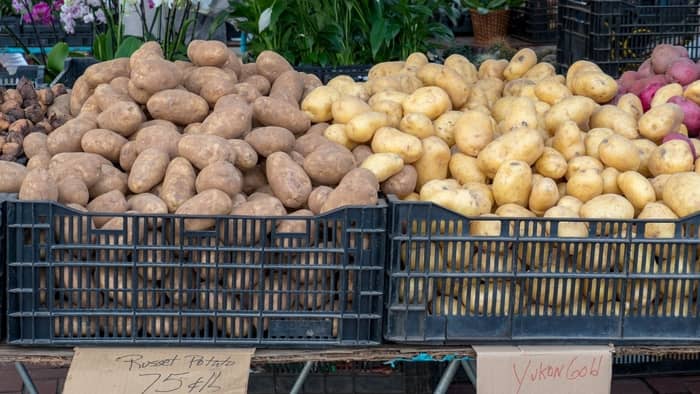Last Updated on April 24, 2022
Today, we’re going to be answering the question: are russet potatoes gluten free? And taking a look at how to cook the perfect roasted russet potatoes. Potatoes are one of the most popular foods in the world – and it’s not hard to see why. They’re incredibly versatile and you can use them for any meal, in a range of ways. But are they always gluten-free? Can you eat russet potatoes if you have celiac disease? Let’s take a look.
What Are Russet Potatoes?
You’ll no doubt recognize a russet potato if you see one, but you may not be familiar with its name. If you’re from the US, you may know russet potatoes better than Idaho potatoes. Russet potatoes are large and don’t usually have many eyes. They’re white potatoes and are very versatile in what you can do with them.

Learn more about: Do French Fries Have Gluten? (& GF Brands)
Are Russet Potatoes Gluten-Free?
Of course! Russet potatoes do not contain gluten and can be safely consumed on a gluten-free diet. While russet potatoes are naturally gluten-free, depending on where and how they’re prepared, they may then contain gluten. For example, if you fry russet potatoes in the same fryer as gluten-containing foods, or if gluten-containing ingredients are used to cook the potatoes – they will then no longer be suitable for a gluten-free lifestyle.
Nutritional Information Of Russet Potatoes
You may be wondering what the nutritional information is when it comes to russet potatoes. A medium-sized russet potato that has been baked has the following nutritional value:
- Calories: 168
- Fat: 0g
- Protein: 5g
- Carbohydrates: 37g
- Fiber: 4g
- Sodium: 24mg
How To Make The Perfect Russet Potatoes
Russet potatoes are absolutely delicious and make for the perfect roast potatoes – with a light, fluffy interior, and a crispy golden exterior. Food Faith Fitness has the best Roasted Russet Potatoes recipe, which I would highly recommend.
Ingredients
The ingredients you’ll need for this recipe are:
- 1 1/2lbs of russet potatoes (cubed into 3/4 inch size)
- 2 tablespoons of olive oil
- 2 tablespoons of dried rosemary
- 1 tablespoon of minced garlic
- 1 1/2 teaspoons of salt
- 1/2 teaspoons of dried thyme
- 1/2 teaspoon of paprika
- 1 tablespoon of minced parsley
Recipe
Now all you need to do is:
Step 1: Prepare the Potatoes
If you have time, place the potatoes in cold water for around one hour. Once left, pat dry and preheat your oven to 425F.
Step 2: Toss the Potatoes
Put the potatoes into a bowl or pan and toss with oil. Finely chop the rosemary and place in the same bowl. Now add all of the other ingredients (bar the parsley) and mix well to ensure all of the potatoes are coated.
Step 3: Cook the Potatoes
Place the potatoes onto a baking sheet, ensuring there’s space between them. Bake in the center of a preheated oven for around 10 minutes. Give the baking sheet a shake and then cook for a further 10-15 minutes. The outside should be golden, and the insides should be soft.
Step 4: Enjoy!
Add the fresh parsley to the potatoes and your potatoes are now ready to serve!
Read more about: Do Mashed Potatoes Have Gluten?
Which Potatoes Can You Eat With Celiac Disease?
The truth is, if you’re buying potatoes in their rawest form, they are all suitable for those with celiac disease, or gluten intolerance. Potatoes are suitable for all dietary lifestyles (unless you’re intolerant to potatoes, of course!).
You may not know this, but there are actually hundreds of different varieties of potatoes – all of which are gluten-free. Some of the most common varieties you’ll usually see in your local grocery stores are:
- russet potatoes
- white potatoes
- red potatoes
- purple potatoes
- sweet potatoes
- petite potatoes
- fingerling potatoes
Ways To Make Potatoes
There are so many different ways to use potatoes. Here are some of our favorites:
- crispy Hasselback potatoes
- twice-baked potatoes
- potatoes au gratin
- roast potatoes
- scalloped potatoes
- cheesy potatoes
- potato flatbread
- fondant potatoes
And of course, there are the traditional ways we know and love like French fries, mashed potatoes, and hashbrowns.
It’s worth noting that you must ensure you’re using gluten-free products when making these dishes, as not all of them are gluten-free, but can easily be made with gluten-free alternatives.
Conclusion
I hope this article has helped to answer the question: are russet potatoes gluten-free? And also helped you to create the perfect roasted russet potatoes. The most important thing to remember is that all raw potatoes are gluten-free. And the only time you need to be wary is if they’ve been prepared in an area where gluten is present, or if it’s been made with gluten ingredients.
Do you know of any other recipes using russet potatoes? What’s your favorite potato? Please feel free to let me know in the comments below. Sharing is caring!
FAQs
Can I Eat Potatoes on a Gluten Free Diet?
Of course! In fact, potatoes are a great way of replacing foods like gluten containing pasta and bread. As potatoes are naturally gluten free, full of carbohydrates and can be used in so many ways - they're the perfect food to add to your diet. Much like any food though, it's important to eat in moderation and eat as part of a varied, balanced diet.
What is the Difference Between a Russet Potato and a Regular Potato?
To look at, a regular white potato and a russet potato can look very similar - but surprisingly, they do have a different taste! Russet potatoes are fluffy and have an almost earthy taste. Whereas regular potatoes are very mild and are more dense. White potatoes are also much paler inside than russet potatoes. They are both equally as delicious!
What Are Russet Potatoes Good For?
Russet potatoes can be used in a range of different ways. From baking, to mashing, to roasting. They're also a great potato choice if you're making French fries. They're also often used as potato chips (or crisps). As the inside is so fluffy, they're the ideal choice if you're looking for soft, light potato products.

Hi, my name’s Zoë. I’m 28 years old and live in London, UK. I work full time as a freelance writer and critic for West End theatre. Writing has been a passion of mine for as long as I can remember. I spend most of my free time at the theatre, or at conventions. I’m married to the love of my life, and live in a small apartment with my fur baby, Lillie. I run two of my own blogs: No Safer Place and Stage to Page: both of which have won awards. I also have a YouTube channel where I talk about all things stagey.

